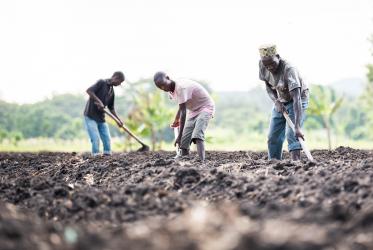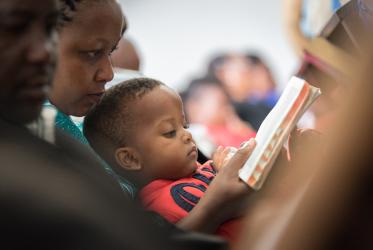At the Conference on World Mission and Evangelism, held in Tanzania in March, WCC communications interviewed Rene van Dongen, United Nations Children’s Fund (UNICEF) Deputy Representative. Van Dongen spoke about Churches’ Commitments to Children, which is now supported by more than 200 churches and partners worldwide. The initiative was created when the WCC and UNICEF facilitated a broad consultative process around the question ‘How can churches use their influence to improve children’s lives?’
Q: What are the biggest challenges children in Tanzania face today?
Van Dongen: For us, the challenges affect two different groups. The first group of challenges is around the early years, the young children zero to three years old. There are issues with stunting (chronic malnutrition), water and sanitation, parenting, caregiving, and early stimulation, amongst other issues. With the young child, we really want to ensure that the brains of the children develop and that we reduce stunting and chronic malnutrition which can affect children for the rest of their lives if not addressed at an early age.
The second group of interventions is around adolescence. That’s another window of opportunity when children reach 9-10 years until 19 years. Again, it’s an opportunity where lots of changes happen and children need a lot of support, a lot of information. There are a number of health issues, also some nutrition and schooling issues. The girls, for instance, are exposed to lots of risks. For instance adolescent girls are three times more at risk of becoming infected by HIV in Tanzania than the boys - so the risks of the girls increase dramatically. But also for the boys, sometimes, for instance, with child labor. Children drop out of school and start working. For girls, teenage pregnancy is also an issue in Tanzania. So the adolescent years from 10-19 years are another window of opportunity where children need a lot of support.
Crosscutting through that are parents and caregivers. For all children, but especially very young children and adolescents, support from parents and caregivers is important. Parents and caregives need to provide a supportive environment and practice behaviours that help children reach their full potential .
Q: Could you comment on the partnership between UNICEF and the World Council of Churches, specifically Churches’ Commitments to Children?
Van Dongen: I think it’s a very important partnership. At UNICEF we work with many different partners since change is possible only through collective effort. We work with government partners, NGOs (non-governmental organizations), CSOs (civil society organizations), the private sector, and faith leaders, whether they are Christians, Muslims, Hindus, or others. We work with faith leaders because they have a very important role, especially in changing behaviors and addressing social norms. Many churches have a focus on families, on fathers, on mothers, on caregivers. It’s important that the churches and the faith leaders support the parents and the children.
Within the Churches’ Commitments to Children, it’s good to see that protecting children in the churches has been given priority. Churches and mosques need to be safe places for children. That’s very important. Also, especially for the adolescents, to give them a voice so they can act and do things that build their self-esteem, and give them responsibilities in the church but also in their family, school and the wider community. The third theme which is also very interesting is about climate justice. That is something forward looking because if we don’t fix it now it will affect all of us in the future. These themes are very relevant. It’s an extremely good beginning and it gives a lot entry points for churches to promote and support positive action for children and their families in their countries and communities. The partnership that we have here with the religious organizations includes Muslims, Hindus, Catholics and the Christian Council of Tanzania. They have identified a few concrete actions and they will continue to advocate for change using their own platforms and organizations.
Q: Do you believe this kind of cooperation between UNICEF and the WCC is a new approach that actually brings more holistic solutions to the humanitarian issues we face worldwide? Can churches bring access to specific faith communities and assist the work of the UN?
Van Dongen: I certainly think so. The issues that children, parents, caregivers and families face today are simply too big and complex and need coming together of different actors. Everybody needs to contribute and work together, especially in the field of social norms, behaviors, and behavior change. We need to create and support positive role models. Faith leaders and faith-based organizations are key. They can really help people - especially parents and caregivers, but also children and young people themselves - make a change. I think that is really very important and this cooperation can help with that.
* By Xanthi Morfi









